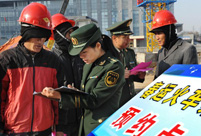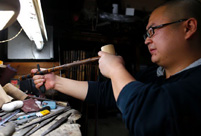 'Jin' named the word of the year by cross-strait netizens
'Jin' named the word of the year by cross-strait netizens Chinese scientific expedition goes to build new Antarctica station
Chinese scientific expedition goes to build new Antarctica station
 Chinese naval escort fleet conducts replenishment in Indian Ocean
Chinese naval escort fleet conducts replenishment in Indian Ocean 17th joint patrol of Mekong River to start
17th joint patrol of Mekong River to start China's moon rover, lander photograph each other
China's moon rover, lander photograph each other Teaming up against polluters
Teaming up against polluters
New rules aim to prevent officials from hindering cases against them
The people's right to sue government agencies and officials should be protected by the introduction of more detailed rules, according to a draft amendment to the Administrative Procedure Law.
The law, which defines procedures to challenge government agencies in court, is to be revised for the first time since it was enacted on Oct 1, 1990.
Xin Chunying, vice-chairwoman of the Legislative Affairs Commission of the Standing Committee of the National People's Congress, said on Monday that many courts are reluctant to accept administrative lawsuits, and as a result, lots of people resort to petitions.
It has become an urgent need to revise the Administrative Procedure Law since it's difficult for the people to have their administrative suits accepted by the court and tried fairly, she said.
The Standing Committee of the NPC, the top legislative body, is scheduled to revise the draft during its bimonthly session that lasts from Monday to Saturday. The draft, with 99 rules, gives more detailed regulations than the current law, which has 75 rules.
Individuals or organizations who believe their rights of owning or using natural resources, including land, minerals, water, forestry, mountains and grassland, have been infringed by government agencies, can file suits, according to the draft.
The draft rules that courts should guarantee people's rights to sue public power, and that government organs or individuals are not allowed to hinder the exercise of judicial power.
If the people have difficulties in writing a lawsuit, they can bring an oral suit and the court must help them make a written record.
The court should make clear any reason for refusing a suit; and it should file a lawsuit within seven days after accepting a claim, according to the draft.
To prevent government agencies from intervening in the trial process, the higher people's court can designate a court in a place where the defendant or the plaintiff is not located, the draft says.
The draft also rules that if the people sue government agencies at county level and above, the case should be put under the jurisdiction of the intermediate people's court, which is also aimed at preventing the government from interfering.
The members of the NPC Standing Committee heard the explanation of the draft amendment on Monday, and they will review the draft on Wednesday.
Xin recommended that the draft amendment should add some regulations to urge the government agencies to perform their duties, such as reporting administrative bodies that refuse to carry out the court's verdict on administrative lawsuits.
Jiang Bixin, vice-president of the Supreme People's Court, said earlier this month that the Administrative Procedure Law should be revised to curb public power and promote efficiency in public administration.
A systematic reform is needed to resolve the problems that affect the fairness of justice, Jiang told law professors at a seminar on Dec 6.
According to the decisions made last month at the Third Plenary Session of the 18th CPC Central Committee, the management of staff members and properties of courts and procuratorates below the provincial level will be unified to ensure independence and fairness in justice bodies.
The plenum, which set the blueprint of deepening reform, also pledged to separate the jurisdictions of courts from administrative divisions.
Jiang Ming'an, a law professor at Peking University, said the amendment is expected to prevent the government from interfering with lawsuits against them since the cases might be handled by courts in other jurisdictions.
It's difficult currently for people to sue the government because the revision of the law has lagged behind, he said.
The Shenzhen Intermediate People's Court heard 2,531 administrative cases last year, of which the government lost only 6.8 percent, according to a white book released on Nov 6.
 People prepare for upcoming 'Chunyun'
People prepare for upcoming 'Chunyun'  Highlights of Beijing int'l luxury show
Highlights of Beijing int'l luxury show Record of Chinese expressions in 2013
Record of Chinese expressions in 2013 China's moon rover, lander photograph each other
China's moon rover, lander photograph each other 17th joint patrol of Mekong River to start
17th joint patrol of Mekong River to start Spring City Kunming witnesses snowfall
Spring City Kunming witnesses snowfall Heritage of Jinghu, arts of strings
Heritage of Jinghu, arts of strings Weekly Sports Photos
Weekly Sports Photos PLA elite units unveiled
PLA elite units unveiled  China's stealth fighters hold drill over plateau
China's stealth fighters hold drill over plateau Chinese navy hospital ship's mission
Chinese navy hospital ship's mission  "Free lunch" program initiated in NW China
"Free lunch" program initiated in NW China  Rime scenery in Mount Huangshan
Rime scenery in Mount Huangshan DPRK's Kaesong Industrial Complex
DPRK's Kaesong Industrial Complex 'Jin' named the word of the year
'Jin' named the word of the year Day|Week|Month